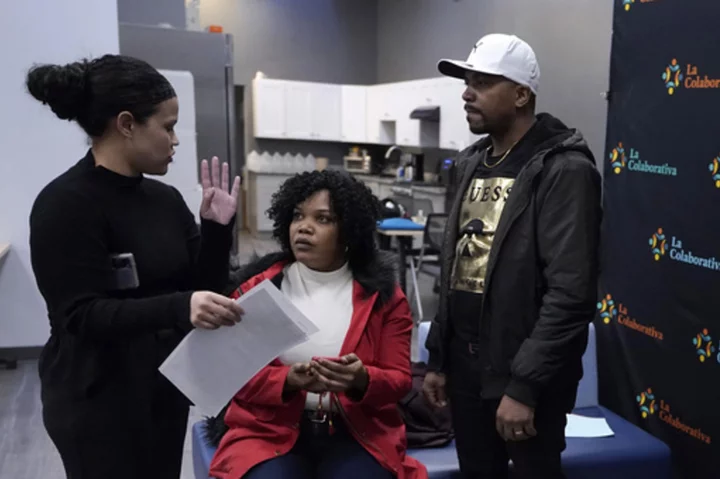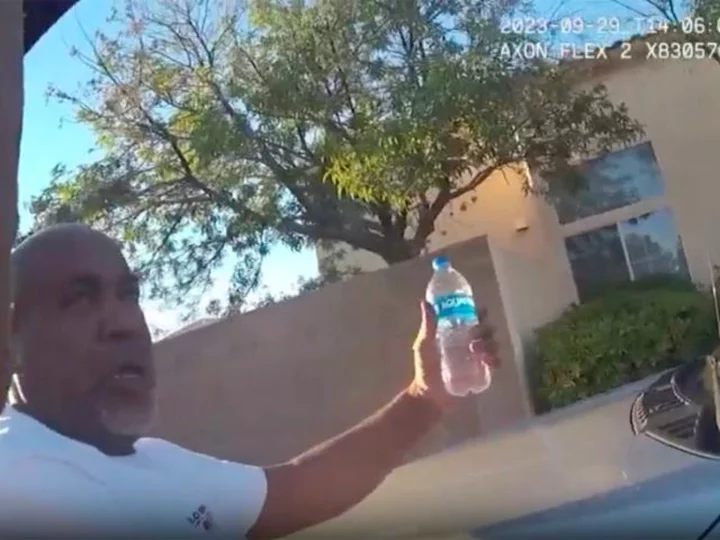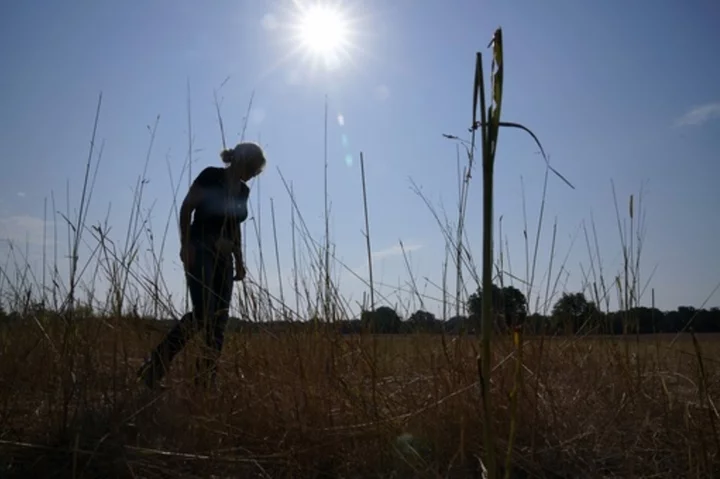BOSTON (AP) — Advocates scrambling to find shelter for homeless migrant families newly arrived in Massachusetts say they're relying on a patchwork of airport lounges, Uber rides, hospital waiting rooms and walk-in church shelters after the state capped the number of family shelter spots and created a wait list.
The cap has tied the hands of those trying to help families seeking refuge from increasingly cold nights, dumping those families on a kind of emergency housing merry-go-round as they wait for spaces in the state's family shelter system to open up.
In a crowded waiting room at the Immigrant Family Services Institute in Boston’s Mattapan neighborhood, Emmanuel Alexis, 49, his wife Regina and their two children were looking for a place to stay. After gangs burned the family’s house in Haiti, they fled to Mexico and then to the United States. They arrived in Boston a week ago and have been staying with friends, but can no longer stay and need to find something more permanent.
“We were saved by the grace of God,” Regina LaGuerre Alexis said through a translator. “We got here with the children. For us, it’s like a miracle.”
By 3 p.m. Wednesday they had already been waiting most of the day.
“We don’t have a place to sleep. It’s cold. The cold is hard for the kids since they are not used to it,” Regina LaGuerre Alexis said.
Cherlin Dubon, a triage case specialist at La Colaborativa in Chelsea, Massachusetts echoed those concerns. She faulted the state for not anticipating the sudden demand created by the cap.
“Right now there’s no place to send them,” she said. “They could have done better.”
To help just one family, Dubon has relied on multiple Uber rides to a church in Natick, about 28 miles from the agency. At Logan International Airport state police and airport staff have used airport buses and taxi vouchers to transport families to one of the state’s homeless welcome centers.
Gov. Maura Healey, who instituted the cap, said the state is working with local groups to provide temporary spaces for those on the wait list. The cap took effect last week when the state crossed a threshold set by Healey of 7,500 families in emergency shelters.
The administration, citing security concerns, has been reluctant to release some details of its plan, including the location of a clinic it sponsored with the Department of Homeland Security to help migrants get work authorizations.
From the clinic, more than 200 migrants submitted work applications to U.S. Citizenship and Immigration Services on Monday, and hundreds more filed applications Tuesday.
The spike in demand is being driven in part by migrant families entering the state. About half of the current shelter caseload are new arrivals to the state, according to the administration.
Other states have faced a similar increase in demand for shelter. In New York City Mayor Eric Adams announced he's limiting shelter stays for migrant families with children to 60 days. In Chicago, officials have looked to relocate migrants from police stations and the city’s airports to winterized camps with massive tents.
In October, the city of Denver purchased 38 combined plane and bus tickets for migrants to Boston.
Healey said Massachusetts is taking other steps, including teaming with the United Way of Massachusetts Bay on a $5 million grant program to help local groups create temporary shelter spaces.
“I think we’re doing all that we can right now. The key is getting people exited from shelters. That will increase capacity in existing shelter space,” she said. “The key really is getting people working.”
Rev. Dieufort Fleurissaint, chairman of Haitian Americans United and senior pastor at Total Health Church in Mattapan, said he's concerned the state hasn't already set up a place for migrants on the waiting list to stay temporarily.
He said the faith-based community is talking about providing space for some families in churches, but can only do so much.
“My biggest concern is the safety of these families when they arrive,” Fleurissaint said. “We are not in a position as the Haitian community to support those families in terms of housing accommodation.”
Since Sept. 1 more than 400 families have exited the emergency family shelter system, opening spots for other families. Even so, the newly created wait list is starting to fill up. As of midday on Monday, 22 families were on the list.
On Monday the United Way began accepting applications from community groups to create immediate emergency shelter. The goal is to provide overflow shelter options — including in houses of worship, community centers, and school buildings with bedding, showers, meals, laundry, staffing and security.
On Beacon Hill, lawmakers are working on a $250 million plan to address emergency housing with a portion of the funds going for costs associated with creating temporary emergency shelter sites.
Critics have argued Healey’s decision to cap shelter placements violates the state’s “right-to-shelter” law. Under the four-decade-old law, Massachusetts is required to provide emergency shelter to eligible families.
Franklin Dalebert, an assistant director at the Immigrant Family Services Institute, said the past week has been hectic and that families come to the clinic at all hours.
“So many people come here and they have no place to stay,” he said. “We don’t have resources. We don’t have places.”
Dalebert said they are leaning on churches, but weren’t able to offer the Alexis family anywhere to stay.
“They had no plans to come here. They were working. They were professional. They had their own business,” he said. “We have to find a way to help them out.”









